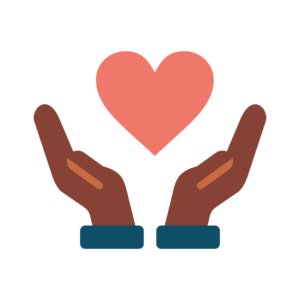How can you continue friendships and relationships with people you strongly disagree with? In what ways can you understand perspectives and motivations so different from your own? How can you forgive those who hurt you? While often interchanged with sympathy, the answer lies in a much deeper, complicated acknowledgment of someone else’s position: empathy. With a world divided in too many ways to count, building empathy in yourself is more important now than ever.
Danielle Bernstein, a Possip intern majoring in Human and Organization Development and Sociology at Vanderbilt University, explores the importance of and how to develop empathy.
Three years ago, Possip CEO and founder Shani Dowell highlighted the importance of empathy in children. She discussed her observations of children’s troubling lack of empathy due to the pandemic. She posited that during the pandemic, children viewed the world through their eyes only; they lacked external, communal experiences integral to empathy development.
Today, a hyperpolarized culture, a lack of understanding of our shared humanity, and a systemic focus on our differences rather than our similarities have allowed Shani’s words to remain relevant – and not just for kids. As we enter an incredibly contentious moment in American history this November, we– young adults like me and educators, professionals, and parents like you – must understand the true value of empathy and how to develop it.
The Importance of Empathy
I was an embarrassingly sensitive kid. Every bout of exclusion and one-off comment made me run for the hills. I always wanted my mom to support me unconditionally and speak ill of my playground foes. She executed the former without wavering. However, to my confusion, my mom offered a new perspective with the words “You never know what someone is going through.”
I internalized those words as I entered high school and later college. I began to understand that people suffering themselves often resort to problematic, hurtful behavior toward themselves or others. This by no means excuses the behavior of those who hurt us, but it reminds us to exercise forgiveness and self-care. Practicing empathy in these situations allows us to understand other’s positions and struggles.
It allows us to view the context behind someone’s actions and decisions.
Acknowledging the context of others does not simply benefit them. It is vital for self-preservation. Empathy allows us to forgive easier and better distinguish between inexcusable behaviors. Empathy lets us see our closest friends, family, and even strangers as flawed humans who are absolutely still deserving of love and care. Whether someone invalidates your experiences, disagrees with you, or votes for a different candidate, practicing empathy places you in their shoes, allowing you to understand where they are coming from.
Demonstrating empathy for loved ones can be difficult but necessary, yet it is equally important to demonstrate empathy for strangers. While empathy in relationships creates deeper bonds, empathy for strangers maintains our shared humanity. Empathy helps us break through political and societal polarization. It can help us see the person even when we feel like the other side’s behavior and decisions seem unjustifiable. Empathy allows us to engage in constructive conversations with those we disagree with; it allows us to accept that the people whose beliefs make us scream at our televisions are worthy of kindness and compassion.
How to Develop Empathy
Most of us don’t just wake up one day with stores of empathy at our disposal. It requires dedication and practice. Below are four actionable steps to cultivate your ability to empathize with others.
Tip 1: Practice active listening
Active listening goes beyond simply hearing someone. It involves listening to understand rather than to respond. Active listening includes asking open-ended questions to understand the other’s position, practicing empathy in the process. Through active listening, you are better able to put yourself in someone else’s shoes. Explore more about active listening and its importance in engaging in empathetic but assertive communication here.
Tip 2: Talk with people who differ from you
Putting a face to the prejudices you hold and positions you despise allows you to understand that there are people behind stances; real, breathing people with whom you likely have more similarities than differences. Engaging in conversations with those different from you develops empathy. You will begin to understand the various motivations and perspectives that influence the behaviors and beliefs you don’t approve of. Engaging in these conversations also allows us to understand how people’s identities have shaped their real-world experiences.
Tip 3: Seek media that challenges you
Similar to engaging in conversations with those different from you, reading media that highlights opposing viewpoints to your own can facilitate a deeper understanding of those you disagree with. It allows you to understand why people think, feel, and act the way they do. If you’re looking for other news sources or to check the bias of your current sources, check out the Ad Fontes Media Bias Chart.
Tip 4: Don’t isolate yourself during difficult times
As Shani discussed in her 2021 blog, isolation during difficult times reduces our empathy and understanding for one another. We see things through our own eyes, rarely considering that other viewpoints exist. During difficult times, contentious times, and polarizing times, we must avoid isolation. Isolation allows us to forget the validity of other people’s experiences, and it degrades our sensitivity toward others.
Ultimately, we must continue to build and demonstrate empathy during contentious times – times when we feel we can’t muster empathy or understanding for others. We can draw on empathy to help maintain our relationships and exercise kindness with all around us. Through practicing empathy, we all can have stronger, deeper relationships, reduce prejudice, and exercise forgiveness. And most importantly, strengthening your ability to empathize will help you sit next to that family member at Thanksgiving and pass them the stuffing.

Speed Read (tldr) of The Importance Of - And How to Cultivate - Empathy in Contentious Times

1. Understanding Empathy’s Importance: It is crucial for maintaining relationships and understanding differing perspectives, especially in today’s polarized society. It allows individuals to view others as flawed yet deserving of compassion, which aids in forgiveness and conflict resolution.
2. Empathy for Strangers and Loved Ones: Demonstrating empathy not only strengthens personal bonds but also fosters a sense of shared humanity. It helps break down societal divisions, enabling constructive dialogue even with those we strongly disagree with.
3. Practical Steps to Cultivate Empathy: Developing empathy requires intentional effort. Key strategies include practicing active listening, engaging with diverse viewpoints, consuming challenging media, and avoiding isolation during tough times. These practices enhance our ability to connect with others and foster understanding.
Read below for resources, tips, and the why!


